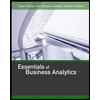A cargo plane has three compartments for storing cargo: front, center, and back. These compartments have capacity limits on both weight and space, as summarized below: Compartment Weight Capacity (Tons) Space Capacity (Cubic Feet) Front 12 7000 Center 18 9000 Back 10 5000 Furthermore, the weight of the cargo in the respective compartments must be the same proportion of that compartment's weight capacity to maintain the balance of the airplane. The following four cargoes have been offered for shipment on an upcoming flight as space is available: Cargo Weights Volume Profit (Tons) (Cubic Feet/Ton) (S/Ton) 1 20 20 500 270 2 16 700 350 3 25 600 310 4 13 400 240 Any portion of these cargoes can be accepted. The objective is to determine how much (if any) of each cargo should be accepted and how to distribute each among the compartments to maximize the total profit for the flight. Solve this model by the simplex method and determine the maximum possible profit. Maximum profit = $
A cargo plane has three compartments for storing cargo: front, center, and back. These compartments have capacity limits on both weight and space, as summarized below: Compartment Weight Capacity (Tons) Space Capacity (Cubic Feet) Front 12 7000 Center 18 9000 Back 10 5000 Furthermore, the weight of the cargo in the respective compartments must be the same proportion of that compartment's weight capacity to maintain the balance of the airplane. The following four cargoes have been offered for shipment on an upcoming flight as space is available: Cargo Weights Volume Profit (Tons) (Cubic Feet/Ton) (S/Ton) 1 20 20 500 270 2 16 700 350 3 25 600 310 4 13 400 240 Any portion of these cargoes can be accepted. The objective is to determine how much (if any) of each cargo should be accepted and how to distribute each among the compartments to maximize the total profit for the flight. Solve this model by the simplex method and determine the maximum possible profit. Maximum profit = $
Intermediate Financial Management (MindTap Course List)
13th Edition
ISBN:9781337395083
Author:Eugene F. Brigham, Phillip R. Daves
Publisher:Eugene F. Brigham, Phillip R. Daves
Chapter23: Other Topics In Working Capital Management
Section: Chapter Questions
Problem 3MC: Write out the formula for the total costs of carrying and ordering inventory, and then use the...
Related questions
Question
Do not use Ai

Transcribed Image Text:A cargo plane has three compartments for storing cargo: front, center, and back. These compartments have capacity
limits on both weight and space, as summarized below:
Compartment
Weight Capacity
(Tons)
Space Capacity
(Cubic Feet)
Front
12
7000
Center
18
9000
Back
10
5000
Furthermore, the weight of the cargo in the respective compartments must be the same proportion of that
compartment's weight capacity to maintain the balance of the airplane.
The following four cargoes have been offered for shipment on an upcoming flight as space is available:
Cargo Weights
Volume
Profit
(Tons)
(Cubic Feet/Ton)
(S/Ton)
1
20
20
500
270
2
16
700
350
3
25
600
310
4
13
400
240
Any portion of these cargoes can be accepted. The objective is to determine how much (if any) of each cargo should be
accepted and how to distribute each among the compartments to maximize the total profit for the flight.
Solve this model by the simplex method and determine the maximum possible profit.
Maximum profit = $
Expert Solution
This question has been solved!
Explore an expertly crafted, step-by-step solution for a thorough understanding of key concepts.
Step by step
Solved in 2 steps with 2 images

Recommended textbooks for you

Intermediate Financial Management (MindTap Course…
Finance
ISBN:
9781337395083
Author:
Eugene F. Brigham, Phillip R. Daves
Publisher:
Cengage Learning

Survey of Accounting (Accounting I)
Accounting
ISBN:
9781305961883
Author:
Carl Warren
Publisher:
Cengage Learning

Essentials of Business Analytics (MindTap Course …
Statistics
ISBN:
9781305627734
Author:
Jeffrey D. Camm, James J. Cochran, Michael J. Fry, Jeffrey W. Ohlmann, David R. Anderson
Publisher:
Cengage Learning

Intermediate Financial Management (MindTap Course…
Finance
ISBN:
9781337395083
Author:
Eugene F. Brigham, Phillip R. Daves
Publisher:
Cengage Learning

Survey of Accounting (Accounting I)
Accounting
ISBN:
9781305961883
Author:
Carl Warren
Publisher:
Cengage Learning

Essentials of Business Analytics (MindTap Course …
Statistics
ISBN:
9781305627734
Author:
Jeffrey D. Camm, James J. Cochran, Michael J. Fry, Jeffrey W. Ohlmann, David R. Anderson
Publisher:
Cengage Learning